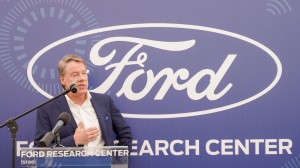
The new Ford Fusion Hybrid is a third-generation test vehicle that Argo AI is now testing in Detroit.
Ford Motor Co. has begun testing autonomous vehicles around its new engineering campus in Detroit’s Corktown neighborhood with its AV partner Pittsburgh-based Argo AI even as it launches a new research center in Israel with an eye on developing new technology.
Peter Rander, president of Argo AI, said the new vehicles being tested in Detroit are equipped with a significantly upgraded sensor suite, including new sets of radar and cameras with higher resolution and higher dynamic range.
When trying to see an object that’s very far away, a lower resolution camera may only be able to represent it as a pixel or two. But with higher resolution, you may be able to get a dozen pixels out of the same far away object. In concert with upgraded software, this means our vehicles are getting better at seeing what’s farther ahead and classifying what it is, Rander said in a blog post on the Argo website.
“Our new test fleet also features a brand-new computing system — one that offers far more processing power than in our previous cars, with improved thermal management systems that generate less heat and noise inside the vehicle. That means a smarter vehicle, but also a quieter, more comfortable ride for anyone inside,” Rander said.
(Ford charges ahead with new autonomous unit. Click Here for the story.)
Rander said Argo works to ensure vehicles can continue operating safely in the event that something unexpected occurs. The company’s latest development vehicles now feature redundant braking and steering systems that help maintain vehicle motion control in the event one of the units stops functioning.
Argo is continuing to test in other cities, and bringing these vehicles to Detroit gives it the opportunity to learn how they operate in another environment . Detroit’s major advantage is that Argo has engineering operations there and Corktown serves as Ford’s base for self-driving vehicle development.
“Every city represents a unique opportunity to make our self-driving system smarter because of the exposure to different road infrastructure design, driving behavior and even traffic light placement. The collective knowledge we’re gaining by operating in five very different locales is a big part of the reason why we’re making great progress,” Rander said.
Ford executive chairman Bill Ford flew to Tel Aviv this week to open the Ford Research Center, Israel in the city’s burgeoning technology community.
(Click Here for more about Ford’s $500 million investment in Rivian.)
The new center will serve as a research hub augmenting Ford’s global Research and Advanced Engineering team. It will also support Ford’s automotive and mobility businesses by identifying technologies and start-up companies in the fields of connectivity, sensors, automated-systems research, in-vehicle monitoring and cyber security.

Ford Chairman Bill Ford traveled to Tel Aviv for the opening of the company's new Israel Research Center.
The center will include a vehicle lab to support proof of concept efforts and AI work conducted by the SAIPS team.
Ford has been working with local companies and partners in Israel’s tech community for several years. Through this strong presence, Ford has been able to work with the best technology talent and specialized companies helping to push its research and engineering efforts forward.
(To see more about Ford shutting down its operations in Brazil, Click Here.)
“We recognize the importance of being in one of the world’s leading innovation communities and ecosystems,” Ford said. “This new center is not only an expansion of our existing Research and Innovation centers but provides an opportunity to join a growing innovation community in Israel,” Ford said.


And you thought living in Detroit was dangerous before.